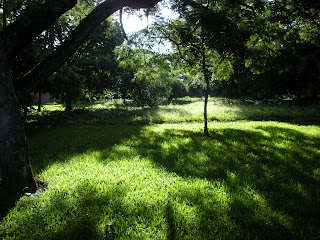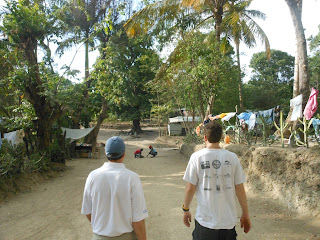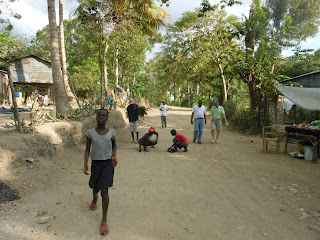The reflection continues. Remembering. Wishing. Praying. Hoping.
Rereading journal entries.
Looking at photos.
This one was taken somewhere between Charlotte and Miami. The colors were astounding. As was the fact that we were in an airplane, at 35,000 feet or so, traveling between states and eventually between countries. As much as I love to fly, I remain baffled by how airplanes work. I took physics in college and tried desperately to figure out the forces of mass, velocity, and whatever else is involved in getting an airplane aloft - but I was repeatedly unsuccessful in my attempts. In the end, I decided that I didn't have to know how it worked; it was enough for me to enjoy the fact that other people knew how it worked, and their hard work made it possible for me "to travel the world and the seven seas."
At the airport in Miami, I spied a small gaggle of palm trees as we walked from our arrival gate to the departure gate. Such simple and quiet beauty in such a noisy and austere place - I couldn't walk past and not attempt to capture it.
Somewhere between Florida and Haiti, we flew over green inlets, white clouds, and the deep blue sea. Who lives there? Who works there? Do they have any idea how beautiful their land is from above? Does anybody?
Surrounded by mud and dirt, assaulted with noise and smoke, unmoving, a father held his son close. More stillness, quietness, and beauty.
Mattresses for sale in the sun, piled up on a dusty road, leaning against a rusty fence. A dog wanders past, perhaps wishing he could lie down and rest, knowing he'd be shooed away. We rode past on our bus, a bus sent to Haiti from North Carolina. A bus manufactured for American school children, now carries Haitian students and teachers, food and supplies, and earnest church folks like us back and forth to school. Past sun-baked mattresses.
Eight of the ten of us met at a team meeting two and a half weeks before we left for Haiti. We introduced ourselves briefly, laughed, groaned, compared malaria medications, offered to bring various supplies, and promised to pack light for the journey. We met at the airport at 4:30 in the morning two weeks ago today and set out on an unimaginable adventure. Even the people who had been to Bayonnais before were on a new and different trip this time.
I remember sitting at that first meeting, wondering - Who are these people? Why are we going to Haiti? What do we hope to accomplish? I'm fairly certain that none of us is better able to answer those questions now than we were a month ago when we met that first time. But I'm grateful for each of those teammates of mine.
Rice paddies, field workers, irrigation trenches, palm trees, light poles, villages in the distance. Entire cultures, languages, people groups, landscapes, histories, and futures that were completely unknown to me. But there I was, eager to see it all, capture it all with my camera, in my journal, and most of all, in my soul.
Bathing, washing clothes, drinking, cooking, watering their fields, the people of Bayonnais,
like all people everywhere depend on the simple, universal, and undeniable miracle of water.
I'd heard of Doctors without Borders; we saw signs in Creole indicating where they had been headquartered during the recent cholera outbreak. But I'd never heard of Engineers without Borders. We saw signs of where they had been every time we walked or rode over this bridge and small dam and everytime we walked along the canals that bisected the fields and farms of the region.
Upon our arrival at OFCB, I was silenced and awed yet again by the wonder of connection, the fine web of interaction that makes our lives possible. I was silenced and awed by the miracle of our presence there. Because we arrived on a Thursday and because today is also Thursday, I know that I must take time to give thanks. That day - and today - gratitude abounds.
I am thankful for...
1. electrical circuits that hum all night long
2. alarm clocks that sound at 3 am
3. cars that start and don't break down on early morning airport drives
4. functioning airplanes, diligent mechanics and baggage handlers, and sober, attentive pilots
5. unexpired, unflagged passports
6. security checkpoints
7. jetways, runways, and air traffic control towers
8. other people brave enough to go to places like Bayonnais
9. cargo ships large enough to transport North Carolina school buses
10. the fact that the bus waited until arriving in front of the guesthouse before it broke down
11. the Haitian mechanics resourceful enough to get it running again and keep the school's two buses functioning on a daily basis
12. clean sheets, towels, toilets, and sinks prepared for our arrival
13. bountiful meals, prepared by cooks who don't have enough to feed their own families
14. all the new faces, the names, and the stories that Haiti has blessed me with
Thanks be to God!





















































